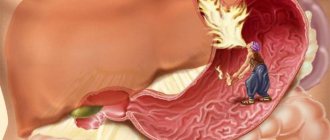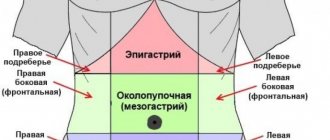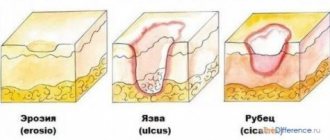Gastritis is one of the most common diseases of the twentieth century. This can easily be explained by the fact that modern society regularly finds itself in stressful situations. The close connection between sciences such as gastroenterology and psychology has been confirmed in medicine even by the most skeptical doctors. Constant worries, emotional stress, mental trauma negatively affect the body. The gastrointestinal tract is one of the first to respond to constant psychological exhaustion.
Why stress leads to digestive diseases
The human brain regulates all physiological processes in the body, the central nervous system reacts to any external factors, which ensures human survival by timely adjustment to certain living conditions. The stability of the hemostatic system also depends on the state of the central nervous system, thanks to which processes of regeneration of damaged organs occur inside a person, as well as a non-stop fight against harmful bacteria and more. If this perfect biological computer has a “virus” in the form of regular mental suffering, fear and negative emotions, this affects the operation of all systems.
The digestive system is the first to react to such external attacks, as a result of which destructive mechanisms are launched that affect the condition of the gastric mucosa, as well as increasing or decreasing the concentration of acid.
After a detailed study of this phenomenon, such a concept as “psychosomatics of gastritis” appeared.
In fact, it is not difficult to prove the fact that a person’s negative emotions quickly lead to gastrointestinal disorders. For example, before an important speech, an exam, or defending a client in court, many people experience bouts of nausea, painful stomach cramps, and even spontaneous vomiting. The severity of manifestations directly depends on the depth of emotional experiences. Considering how sharply the human body reacts to stimulation of the nervous system, it becomes clear why doctors claim that the causes of gastritis can be of psychological origin.
Treatment
A gastroenterologist deals with stomach problems. To make a diagnosis, you need to collect the patient's medical history (complaints) and confirm it with gastroscopy . This diagnostic method, using an optical probe, will help to visually examine the gastric mucosa and take the material for analysis.
Based on the type of gastritis, treatment with medications is prescribed. Nerves and gastritis, their relationship can only be destroyed with sedatives . This is the only method known to medicine. The duration of action of these drugs will help stop inflammation of the stomach only for a certain period of time, then the situation will repeat itself and the mechanism of stomach destruction will start again.
Having learned and understood the psychosomatics of gastritis, you do not need to look for a well-known doctor, buy expensive medications, or allocate time for hospitalization. You need to competently digest all incoming information, as if in parts, in small portions, chewing thoroughly, and consume a poorly digestible product.
Based on the interpretation of psychosomatic gastritis by Louise Hay, you need to accept your situation as absolutely safe. See its protective sides, rely on small nuances that bring joy and deliver positive emotions.
Conclusion
Eliminating the psychosomatic causes of gastritis is not an easy task, but everyone can solve it. The result will be worth the effort spent on achieving it. There are no special people who can do this and others cannot. There are obstacles that sometimes seem insurmountable.
Books on psychosomatics and specialist psychologists are always ready to help in solving, finding old problems that have been pushed into the depths of consciousness. All psychologists view diseases from the perspective of psychosomatic causes.
When is a consultation with a psychotherapist required?
If emotional experiences are so great that it affects a person’s physical condition, causing significant damage to his health, a consultation with a psychotherapist is required. Timely seeking help is very important, since an advanced case can lead to a nervous breakdown and or deep depression and, accordingly, a worsening of the overall clinical picture.
But, as you know, the life of every person is filled with excitement and stress related to work or personal relationships, and how to understand which emotions serve as negative factors that provoke the appearance of diseases such as gastritis or stomach ulcers? Psychosomatics experts say that if a person is under the influence of negative emotions for a long time, his local and general immunity decreases. Negativity refers to the following psychological states:
- feelings of inferiority;
- fear of change;
- anger, hatred;
- hypochondria;
- intense envy;
- a feeling of doom and uncertainty about the correctness of one’s own actions;
- apathy and laziness;
- perfectionism;
- lack of love and attention;
- persistent feeling of guilt, self-flagellation.
People with increased anxiety may have paranoid ideas or a persistent belief that everyone around them is trying to harm them or their loved ones. Such feelings rarely arise out of the blue and rather indicate the presence of moral shocks in the past, which, as they say, “cannot fit into the head.” And an ordinary gastroenterologist cannot cope with such problems even with the help of the most effective medications.
The mechanism of gastritis
Without correcting the psychosomatics of gastritis, it is impossible to achieve a cure for the disease. There is a spectrum of negative emotions that lead to pathology:
- depression, unsatisfactory situation in personal relationships - in marriage, at work, because of children or public opinion;
- fear for tomorrow, concern for relatives in everyday life, intensifying during various events (business trips, illness);
- resentment, guilt, feeling of inferiority due to sluggish, unresolved conflicts - the death of a loved one after a quarrel, resentment towards parents;
- misunderstanding of loved ones, lack of support - a person eliminates stress with food, provides himself with pleasant experiences, which results in overeating and gastritis;
- self-doubt and fatalism, constant exaggeration of events and fear for what has not yet happened;
- L. Burbo is sure that gastritis appears as a result of constant anger at oneself and people;
- Santham noticed that gastritis develops in people prone to ridicule, sarcasm and causticity.
In almost every patient, when studying the anamnesis, psychosomatic factors of pathology are revealed.
How can a psychotherapist help in the treatment of gastritis?
The help of a psychotherapist consists mainly of searching for stress factors that negatively affect health and provoke the development of gastritis. Experienced specialists know how to interrupt the self-destruction mechanism and prevent relapses of the disease in the future. All people are individual: for some, 1-2 sessions are enough, while others will need much more - it all depends on the severity of the person’s experiences and the degree of neglect of the pathological condition. A specialist can use various methods of treating psychological disorders, but the main goal of his work is to teach the patient:
- adequate response to negative situations;
- the ability to forgive offenders and, first of all, oneself;
- painless acceptance of one’s own mistakes;
- the art of self-control and maintaining mental balance;
- independently solving frightening problems and getting rid of feelings of fear;
- correct behavior in difficult life situations.
Psychological reasons for the development of gastritis
Gastritis, as a rule, is observed in people who are anxious, suspicious, unsure of themselves, and fixated on failures. When a person lives in constant anticipation of trouble and with the feeling of being unable to change the situation, it suppresses him so much that he shrinks into a ball of nerves (like his stomach).
There are a number of negative experiences based on internal conflict and mental discomfort that interfere with an adequate response and perception of incoming information:
| Negative experience | Description |
| Fear | Fear has a destructive effect on emotions and thoughts. Here we consider the fear of vulnerability, defenselessness in front of information that comes from the outside world. Fear is based on a lack of trust (in oneself, in the whole world). Without fear, a person would be open. But he feels unprotected, afraid of everything new. The stomach muscles react to this with a spasm, irritating the mucous membrane and causing pain. |
| Anger | This feeling causes the development of gastritis with increased stomach acidity. Negativism and anger are generated by unsatisfied egoism and can bring a lot of trouble. In a state of anger, the production of gastric juice and digestive enzymes greatly increases |
| Laziness | In some cases, the stomach begins to become lazy and does its job poorly. This is usually how a human organ that is prone to laziness behaves. The production of gastric juice and digestive enzymes gradually begins to decrease, which causes the development of gastropathology |
| Irritability | Irritability is anxiety that a person expresses through impulsive actions and harsh words. Irritability breeds selfishness, a negative attitude and intolerance towards people. The state of the stomach is greatly influenced by a person’s state of mind at a time when he is actively interacting with the world. Therefore, the psychosomatic reaction of the stomach to irritability is an increased tendency to inflammatory processes |
| Apathy | Constant disappointments cause a feeling of hopelessness and apathy. In this state, interest in any activity is completely lost. Gradually, this leads to disruption of the functions of organs associated with vigorous activity (including the stomach). This is a psychosomatics of the atrophic form of gastritis, leading to exhaustion |
| Cruelty | Stomach damage often occurs in cases of cruelty. This character trait can even lead to stomach cancer. Cruelty towards loved ones especially contributes to the development of gastropathologies. People often misunderstand what relationships with loved ones are. They have a consumerist attitude towards loved ones and demand that they satisfy their desires and needs. This leads to cooling of relationships and hostility. Self-interest brings great suffering. The stomach quickly reacts to disharmony in relationships. Violent people have an increased risk of psychosomatic illnesses, including stomach ulcers |
| Despair | Sometimes difficult situations arise in life when it is necessary to overcome many difficulties to solve problems. Some people can get out of a difficult situation, while others are simply angry at fate. Despair is expressed in impotent anger. In this state, a person is filled with resentment, and this often provokes the development of an erosive form of gastritis |
Positive emotions are the best medicine
Many doctors have witnessed situations where seemingly incurable patients with great craving and love for life fully recovered due to the positive emotions they drew from others or themselves. And, on the contrary, people who were found to have illnesses that were completely treatable passed away because they did not see and did not want to see the future primarily in their heads. It is not for nothing that people have so many jokes on this topic, the most famous of which is: “if the patient wants to live, medicine is powerless.”
Of course, psychosomatic treatment of gastritis must necessarily be carried out in combination with traditional methods, including diagnostic procedures and drug therapy, since the body needs healing from injuries received as a result of moral experiences.
Positive thoughts will speed up the regeneration process, so the patient’s main task should be to get rid of any negativity and strictly follow the doctor’s instructions.
Most people subconsciously avoid seeing a psychotherapist, mistakenly believing that his help is required only in particularly difficult situations, but in fact this is not the case. Life constantly deals blows to the most valuable thing a person has - health, and the main goal of every sick person should be to preserve it by all available means. An experienced specialist can help not only get rid of serious diseases, but also understand your state of mind, change your life for the better and become truly happy and healthy.
GASTRITIS - (Louise Hay)
Prolonged stay in limbo. Feeling of doom.
A Possible Solution to Promote Healing
I love and value myself. I am brave and calm, I am confident in myself and the safety of my life.
GASTRITIS - (V. Zhikarentsev)
Long-term uncertainty, uncertainty. Feeling of rock.
A Possible Solution to Promote Healing
I love and approve of myself. I'm safe.
GASTRITIS - (Liz Burbo)
GASTRITIS - (Guru Ar Santem)
Acrimony, irony, sarcasm, barbed ridicule.
This type of behavior occurs a lot in today's world. Why doesn't everyone have ulcers?
The energetic mechanism of communication, in which both interlocutors are internally closed, ready to be sarcastic and exchange barbs, resembles a duel between two knights. Both have put on armor and are trying to reach each other with swords. In this case, they do not take offense at each other, because they play by the same rules of communication, they were taught this way by their upbringing, they live by it and accept causticity as the norm.
Diseases arise when sarcasm is directed at a person who lives according to different laws, who is open, vulnerable, and who does not accept a fight as a form of communication. He has the right to be offended if such energy was directed at him, but he gave no reason for this. The natural laws of our planet are on his side.
Stomach diseases are considered one of the most common. A person can struggle with them for years, without even suspecting that the main reason lies not in the way of life, but in the way of thinking. When the psychological factors of the patient’s life are the root cause of the disease, it is time to talk about psychological causes. Why, for example, does gastritis occur? We’ll talk about the psychosomatics of its occurrence today.
Today, much attention is paid to the psychological life of a person. What he thinks about most, how he thinks, how he reacts to events in his life - directly affects the human body. So what does the work of the stomach depend on, and how should you think in order to get rid of an ulcer or gastritis according to psychosomatics?
Principles of correction of emotional factors of gastritis
When eliminating the psychosomatic factors of gastritis, a positive attitude is important. Only the patient’s awareness of negative experiences and emotions and the desire to work with them will lead to healing.
Advice! You can achieve a calm state through proper sleep. Psychological stress and stress are reduced with prolonged rest.
To work through the psychological causes of gastritis, it is necessary to normalize relationships with people, get rid of fears and worries. It is not always possible for an adult to cope without a psychotherapist in this matter. Before treatment from a specialist, reconsider your lifestyle, engage in light physical activity, and provide your body with normal rest.
Treatment with a psychotherapist
Psychosomatic factors of gastritis are one side of the coin. After all, the disease affects the quality of life: due to constant pain, mood disappears, apathy appears, and stress develops.
Psychosomatics indicates that the patient needs to work on the emotional sphere and perception. Only a psychotherapist can provide a competent approach in this area. He will teach you how to deal with all your worries on your own and relieve the stress. The specialist will speed up the treatment of gastritis, eliminating possible complications.
Psychosomatics may be the cause of heartburn, but still, if you have signs of gastritis, consult a doctor. who will make the correct diagnosis. He will prescribe a diet for gastritis and prescribe treatment.
The psychosomatics of gastritis is not as visible and understandable as x-rays, but the causes of the pathology can be overcome if you analyze fears, grievances, and anger at people.
Your thoughts are stronger than you think
Psychosomatics (from the Greek “psyche” - soul, “soma” - body) studies the influence of a person’s mental state on his body. In other words, how your thoughts affect your health.
Even in ancient times, people understood that the soul is directly connected to the body. And if there is no balance in the soul, no harmony, then there will be no such thing in the body. The person will be tormented by pain, obsessive thoughts, despondency and bad mood. Previously, it was believed that in this way the soul makes it clear to a person that he is living incorrectly, that he needs to pay attention to something. And then it was often possible to “heal” the patient simply by listening to him or through conversation.
Over time, science has developed. Outstanding psychologists and doctors began to appear who devoted their lives to studying the problems of humanity. Recently, psychosomatics has reached a scientific level. Hypotheses about the influence of a person’s psychological state on the body have been confirmed in research and experiments. Experts successfully searched for and found new ways to relieve patients from their ailments.
Stages of the disease from the perspective of psychosomatics
Gastritis against the background of mental disorders does not occur overnight; it takes time to fully manifest. Pathological changes in the body go through three stages:
- Conversion disorder is the presence of symptoms that are not supported by any abnormalities in the physiology or anatomy of the organ. For example, a patient is bothered by nausea and vomiting, but examination does not reveal any changes in the gastric mucosa, and even his motility does not suffer.
- Functional syndromes are characterized by dysfunction of an organ in the absence of changes in its structure. For example, according to gastroscopy, there is no pathology in the gastric wall, but the evacuation of food into the duodenum is impaired.
- Actually, psychosomatic illness is associated with a violation of both the anatomy and physiology of the organ. In this case, FGDS in the stomach can reveal a variety of changes - from mucosal atrophy to multiple erosions.
The pathological process can be stopped at any stage, but this requires adequate treatment. And a patient who usually does not advertise his psychological problems does not receive competent help.
In the video, a hypnotherapist will tell you what psychological causes most often cause gastritis.
Houston, we have a problem.
Think about it, all organs receive signals from the brain. And the brain works without stopping for a second. It constantly reads and remembers the surrounding environment, records the mood and reaction to a particular stimulus - and distributes all this throughout the body:
- the area of the mouth and throat receives information about what you wanted to say, but never said;
- the reproductive system receives information about whether you like yourself today (and always) or not;
- and in the stomach area information comes mainly about emotions, whether you were able to cope with them, “digest” them or not.
This is how psychosomatics begins. It's simple.
Causes of psychosomatic gastritis
The psychosomatics of gastrointestinal diseases is based on a person’s inability to express negative emotions:
- depressed feelings;
- irritation, anger;
- deep resentment;
- intense anger;
- fear of change;
- depression, stress, etc.
When a person suppresses these emotions, does not want to notice them, does not give way out, then they have no choice but to affect some organ, for example, the stomach. Suppressed anger, stored inside for a long time, in this way tries to tell a person: “Here I am! Pay attention to me! Let me finally leave you and your body!” After all, the psychosomatics of a stomach ulcer or gastritis is such that a person begins to experience physical pain only when more than enough negativity has accumulated inside.
Famous authors about the psychosomatics of gastritis
Many famous authors write about the psychosomatics of gastritis:
- The famous modern psychologist Liz Burbo believes that the development of all stomach diseases is influenced by the inability to accept a situation or a specific person. The onset of an inflammatory process in the mucous tissues of the stomach walls is caused by resistance to new ideas (especially those proposed by others), dislike and fear of what is not liked, strong anger and an overdeveloped inner critic.
- Louise Hay writes that the stomach is responsible for the assimilation of thoughts and its condition depends on destructive experiences: horror, fear of the new, inability to assimilate new things, uncertainty, doom.
- The famous author O. Torsunov points out the connection between a person’s mood and the state of his stomach. He believes that gastritis with a low level of acidity is provoked by coldness, and in emotional, hot people there is increased acidity of gastric juice.
- The famous doctor and esotericist Luule Viilma claims that when a patient feels useless, passivity and guilt, this can lead to the occurrence of psychosomatic gastritis with an increased level of acidity. In the case when a person works out of guilt, gastropathology with low acidity develops. If a person is constantly forced to strive to be good, modest, hard-working, while experiencing disappointment, fear of guilt, a feeling of panic due to lack of self-love, strive to have a lot and become a standard - this can lead to the appearance of an erosive form of gastritis.
- Dr. R. G. Hamer, who confirmed the relationship between the disease and mental trauma using the biological law of the root cause of the disease, states that gastritis with high acidity is formed if there is a conflict of territorial anger or an identity conflict in the patient’s mental state.
- Santem notes that the development of gastritis is possible in mocking, caustic, sarcastic people.
Louise Hay's theory
American psychotherapist Louise Hay argues that all diseases depend on a person’s internal attitude. For treatment, the technique of self-hypnosis is used, and the patient gets rid of the disease. Louise Hay compiled a detailed table in which she described diseases and the psychosomatics that cause them. She suggests using positive phrases for self-hypnosis, which can even get rid of cancer.
Louise looked at many situations and identified two main groups of negative emotions: doom and uncertainty. Uncertainty can be expressed in many life situations: lack of own housing, permanent work, stable income, instability of life goals and personal relationships.
Louise Hay recommends starting treatment for gastritis by repeatedly repeating positive statements. It is necessary to say out loud the phrase every day: “I am filled with love and approval! I’m protected, everything is fine!”
There is an extended option for correcting the psychosomatics of diseases. These phrases may seem ineffective at first, but regular repetition makes them effective statements:
- I am calm, I will always remain myself;
- life is beautiful and filled with joy;
- I love life, and I am confident in the upcoming joyful events;
- all the bad things are in the past, I have forgiven the offenders;
- my actions and thoughts are correct and grateful.
You need to say these phrases while smiling and looking at yourself in the mirror. Before correcting the psychosomatics of gastritis, you need to prepare:
- If you have started a fight against negativity, you should not push it off until later.
- Treat gastritis in a timely manner and try to change your psychological well-being.
- Show loyalty to yourself, reduce self-criticism.
- Stop returning your thoughts to unpleasant situations.
- Accept what happened as a given, do not carry the burden of negative emotions within yourself.
Video on the topic:
Stomach diseases in women
According to psychosomatics, gastritis in women is expressed in the inability to show love to oneself or to other people. This block comes from childhood, when the child’s desire to be loved is equal to the desire to be fed. Already in adulthood, food is subconsciously perceived by a person as a confirmation of love. This is where the desire to “eat” the offense develops rather than let it go.
Frequent family quarrels can also be a factor in the appearance of psychosomatic gastritis. Quarrels between partners indicate, first of all, misunderstandings and an inability to clearly express their feelings. Sometimes it is difficult for a woman to convey to her husband or lover how she really feels. This usually happens because she does not understand (or does not want to understand) herself, or because she does not accept herself.
Failures on the love front, along with family quarrels, can cause an outbreak of stomach disease: gastritis or duodenal ulcers. In this case, the woman begins to look for the reason within herself and stops believing in her own attractiveness and sexuality. All this accumulates and is expressed in a psychosomatic disorder.
Childhood diseases
Reflux gastritis symptoms and treatment and diet superficial gastritis
Gastritis and gastroduodenitis in children often develop if adults give the child too much information that, due to his age (and stomach volume), he is simply unable to digest - for example, a child at the age of 4 attends two language courses, a music school and two sports sections. Tell me, will you be able to handle working, studying full-time at two universities and reading half a volume of the Great Soviet Encyclopedia every day at the age of 25-30? Even if you master it, you definitely won’t be able to digest the information and assimilate it. This is what happens to the baby.
According to psychosomatics, gastritis most often affects children who emotionally cannot “digest” a specific person in their environment. If in a group in a kindergarten someone constantly provokes conflicts, if a teacher or teacher causes rejection, if there is no warm relationship with a stepfather or stepmother, and this is accompanied by internal tension and irritation, then one should not be surprised by such a diagnosis.
It is important to approach treatment correctly and comprehensively. The child most often requires the help of a qualified child psychologist
Although people have been talking about the influence of negative emotions on a person’s physical condition since the time of Aristotle, our society still associates turning to a psychotherapist as something shameful. Compatriots should learn from the citizens of Europe, where a personal psychologist is a fairly common phenomenon.
As James Allen said, “No one can cure the ills of the body better than a cheerful thought; goodwill is an incomparable comforter, dispelling all traces of grief and sadness.”
Why does gastritis appear and how to deal with it?
Summarizing all of the above, we can highlight a list of psychological factors that cause stomach disease:
- suppressed emotions;
- fear of change;
- inability to express negative emotions;
- aggression, irritability;
- fear, stress;
- anger, anger, resentment;
- shame, feelings of inferiority, despondency;
- self-examination, self-criticism;
- perfectionism.
There are 2 ways to combat the psychosomatics of gastritis or gastric ulcer: with the help of a psychologist or on your own. Everything is clear with the first method, but let’s talk about the second in more detail.
Psychosomatics of illness according to Louise Hay
The table of diseases compiled by Louise Hay has long been popular. People find and use it on their own, some are told about it by friends, others are told by doctors.
The main idea of this table is that any disease can be cured independently with affirmations and positive statements. These attitudes must be pronounced every day (morning and evening), but they must not be said automatically like “good morning,” but with feeling, strength and confidence. Only then will the affirmations begin to take effect.
So, what does Louise Hay say about stomach diseases from a psychosomatic point of view:
- Stomach diseases are caused by fear, horror, inability to learn new things, fear of change. Af.
- Gastritis - caused by a feeling of uncertainty, doom. Af.
- Heartburn is caused by deep fear. Af.
- According to psychosomatics, a stomach ulcer is caused by fear, a feeling of inferiority and inferiority. Af.
Psychosomatic causes of stomach diseases
Psychology of diseases
Psychosomatics as a branch of psychology continues to develop, therefore there are different explanations for the causes of diseases. As a rule, they are similar to each other, but at the same time they have some differences. Let's look at the theories of the most famous and authoritative psychosomatists of our day.
Louise Hay's opinion
According to Louise Hay, the reason lies in negative thinking and a person’s lack of self-love. The psychologist advises dealing with the problem with the help of affirmations - positive attitudes for self-hypnosis, which need to be pronounced in the morning and evening. For each of the gastrointestinal diseases, Louise chose her own affirmation:
- Gastritis: “I love myself. I approve of myself. I'm always safe." The reason is a feeling of uncertainty and doom.
- Heartburn: “I breathe calmly, deeply. I'm safe. I trust life." The reason is strong fear.
- Ulcer: I love and approve of myself. There is peace in my soul. Everything goes well". The reason is fear and feelings of inferiority.
- General affirmation for stomach and intestinal diseases: “Life does not harm me. I learn something new at any moment of the day. Everything goes well".
According to Louise Hay, the main reason is the fear of the new, the fear of change. A person with such problems is not ready to make decisions, does not know how to make mistakes, and often suffers from perfectionism.
Zhikarentsev's opinion
According to Zhikarentsev, problems with the gastrointestinal tract are caused by a person’s inability to “digest” and accept something new. Apprehension, fear, worry, anxiety, inability to learn lessons and assimilate them also contribute. To stabilize the condition, a psychosomatist advises using such an af.
Opinion of Liz Burbo
According to Liz Burbo, disruptions in the gastrointestinal tract occur against the background of internal resistance. This is an indicator that a person cannot accept someone or something. Such a person adapts poorly to new conditions and is unable to accept new ideas or demands. Due to his rigidity and conformism, a person cannot even consider new ideas; he immediately denies them, perceives them as bad and dangerous. Any changes in life can unsettle such a person.
Opinion of V. Sinelnikov
According to V. Sinelnikov, stomach diseases indicate an inability to accept new life experiences, to see in difficulties and changes opportunities for personal growth and improvement of life. These are irritable, anxious and restless people who are afraid of everything new. They are wary of any information, not to mention new acquaintances, assignments, etc.
Opinion of O. Torsunov
According to Oleg Torsunov, stomach diseases are caused by laziness, irritability, apathy and cruelty. Laziness inhibits the functioning of organs, suppressed irritation causes inflammation, apathy leads to fading of organ activity, muscle atrophy, and low acidity. Cruelty and selfish motives provoke inflammation and lead to gastritis.
Getting rid of gastritis with the help of positive emotions
In addition to affirmations, any positive emotions will help cope with an ulcer. Every person has an activity that certainly lifts his spirits and gives him joy: for one it is watching a comedy, for another it is creativity (knitting, sewing, drawing, etc.), for a third it is sports.
When a person does what he loves, his body produces a hormone of happiness, and in large quantities it can work wonders - efficiency increases, the amount of energy increases, and the immune system is strengthened. All this has a beneficial effect not only on the sore stomach, but also on the entire body.
If the psychosomatics of a gastrointestinal tract disease includes negative emotions, then changing the way of thinking will help to begin the fight against the disease. A person is not born with positive thinking. In the process of life, he gains experience, which is reflected in his ability to perceive the world and others.
Think about how you react to different events. Maybe even the most insignificant incident can cause a storm of negative feelings in you? In this case, switching to positive (in psychology - sanogenic) thinking will help you take a fresh look at familiar things.
What does positive thinking mean:
- acceptance of yourself and the world around you;
- acceptance of people with all their manifestations;
- awareness of self-worth;
- accepting the value of another person;
- the ability to find positive qualities in oneself and others, etc.
Psychosomatics of chronic pancreatitis
The disease is dangerous; if chronic, it can lead to injury and scarring of the organ. Stones accumulate in the pancreas and cysts form, due to which digestive juices cannot enter the stomach through the ducts. Digestion of food worsens, blood sugar levels jump. The result is exhaustion of the body and the development of diabetes.
Chronic pancreatitis occurs in those who like to cope with stress and problems with the help of alcohol. Drinking makes you feel better, the body relaxes, nervousness gives way to euphoria, but not for long, so the person reaches for the bottle more and more often. This method of suppressing stress leads to persistent alcohol addiction. Even in the slightest stressful situation, a person reaches for the bottle, and the very fact of abstaining from alcohol becomes stress. The result is inflammation of the pancreas.
Accepting change as a way to combat gastritis
Many experts agree that the psychosomatics of stomach and intestinal diseases is caused by fear of change.
Change always brings with it a feeling of uncertainty, danger and the possibility of failure. When a healthy person is faced with the need to change something in his life, he almost always experiences anxiety for his future. Due to constant tension, not only gastritis can develop, but also more serious problems, such as a perforated ulcer.
To protect yourself from the appearance of gastritis and ulcers or to start a campaign against an existing illness, you need to learn to treat change easily and philosophically. Changes in life are not always negative. Most often, by deciding to make active changes, a person discovers new opportunities for himself. These could be new ways of self-realization or new acquaintances.
In any case, change should not be feared or avoided. Without natural development there is no forward movement.
Somatic symptoms of gastritis in children
A child's body is most sensitive to stressful situations: conflict between parents, moving, cruel treatment by kindergarten teachers, misunderstandings with peers - all this can provoke health problems.
Probably, many parents are familiar with the wording “adaptation period” - the child was active, cheerful, never got sick, but after he went to kindergarten, everything changed. The child’s negative reaction to the unfamiliar team and the new environment was not long in coming - constant sick leave, poor appetite and sleep became the child’s eternal companions.
In such cases, educators most often advise waiting until the child gets used to it, which is fundamentally wrong. If a child is experiencing severe stress and he begins to develop somatic symptoms, then parents urgently need to contact a child psychologist. If parents decide to wait it out and leave the baby alone with their problems, then in the future the child may develop neurotic conditions and concomitant serious diseases of the internal organs.
The psychosomatics of gastritis in children is practically no different from adults:
- A state of severe stress.
- Constantly searching for someone who will support and regret.
- The mood often changes - from fun and laughter to tears and anger.
- Cruelty and uncontrollable aggression.
- Irritability over trifles.
- Apathy.
Freeing yourself from negative emotions
Not all people can express negative feelings. Most people prefer to remain silent in conflict situations rather than give vent to raging emotions. On the one hand, this is the correct position. Sometimes, in order not to aggravate the conflict, it is better to step aside. But after solving the problem, you need to get rid of unpleasant feelings.
How to get rid of negative emotions:
- drawing, coloring;
- dancing;
- run;
- listening to music;
- breathing exercises;
- cry;
- beating pillows, etc.
Ways to Heal
The above psychosomatic reasons make it clear that medical treatment of the body alone cannot be successful. At the same time, we should also engage in healing the soul, since we realized that the health of his stomach depends on how a person reacts to incoming information and processes it.
If a person does not like the taste (content) of information “food”, and he “swallows” it “without chewing” in order to get rid of it faster, then he will experience indigestion and heaviness in the stomach. Constantly doing this can upset the stomach and lead to illness.
To prevent this from happening, we advise you to listen to Liz Burbo's recommendation: take it with love and patience, and the stomach will also accept and cope with its work.
After all, everything that your surrounding world offers you: people, relationships with them, events, knowledge, etc. – all this is given for your development and growth. Why miss this opportunity?
Yes, you will have to carefully “digest” - process the information received and impressions about yourself, about the world and your place in it, about loved ones. But this only benefits us: we become wiser, grow emotionally, morally, mentally and spiritually.
I wish you Love in accepting Life to the fullest!
Lada
Why is it so important to be alone with yourself?
Gastritis and ulcers are very insidious ailments. If they are caused by psychological reasons, then it becomes simply impossible to cure them without working on yourself. Psychosomatic diseases of the stomach require deep immersion into oneself, discovery of hidden emotions and their release.
The fight against the psychosomatics of gastritis is similar to the principle of operation of the stomach itself: for example, if you have eaten a low-quality product, your body (the stomach, in particular) immediately lets you know about it. He doesn't know how to speak, so he only gives pain signals. It’s the same with emotions: if they are of poor quality, negative, and there are a lot of them, your body is also trying to communicate this. The main thing here is to hear and correctly interpret these signals.
Learn to watch not only what you eat, but also what you hear, feel and say. The quality and freshness of your emotions are no less important than the quality of food!
Psychosomatic approach
Currently, a specific treatment area that connects the etiology of most diseases with human psychosomatics is widely popular. The theory, recognized in many countries, was developed by the famous healer Louise Hay. She convincingly proves that the disease is caused by mental disorders, and psycho-emotional factors are decisive.
What can be common between gastritis and psychosomatics? Gastritis combines several gastric pathologies of different etiology and pathogenesis associated with inflammatory-dystrophic lesions of the stomach. The disease is an inflammatory reaction in the mucous membrane, causing digestive dysfunction and pain. Pathology can be generated by various exogenous and endogenous factors, among which infectious lesions (Helicobacter pylori bacteria), unhealthy diet, alcohol and smoking, poisoning and intoxication are especially prominent.
Psychosomatics is usually understood as 2 main directions - the provoking effect of psycho-emotional factors on the development of diseases and psychosomatic pathologies that are caused by mental disorders. In the first case, the neurogenic factor enhances the impact of the underlying causes and helps trigger the etiological mechanism. In terms of gastritis, this direction is not disputed by anyone and is confirmed by research. Stressful situations and psychological overload contribute to disruption of metabolic processes and provoke the production of inflammatory mediators.
Adherents of this theory go much further. They attribute gastritis to a psychosomatic pathology, arguing that the mental state underlies the etiological mechanism, and other factors only help trigger it. Even the discovery of the infectious nature of most cases of gastritis could not refute such assumptions. The argument is simple: Helicobacter is present in the stomach of almost all people, but not everyone gets sick. The causative agent of the disease begins to actively develop in the presence of a psychosomatic factor.
Important information: The most effective folk remedies in the treatment of gastritis
There is constant debate among scientists about this theory, but an indisputable fact should be noted: the participation of a psychotherapist in the treatment of gastrointestinal diseases often produces positive results.
Is it possible to be healed?
Her works are structured in a rather unique way; the book begins with a voluminous section in which Louise examines psychosomatic diseases and their causative factors. She herself understands and tries to explain to her reader that many of the existing reasons that doctors use are outdated.
It is quite difficult for an ordinary person to comprehend the psychosomatics of Louise Hay. She tries to explain that people themselves form stereotypes as follows:
- remembering childhood psychological traumas;
- neglecting oneself;
- living in dislike with oneself;
- being rejected by society;
- melting fears and resentments in the soul.
Louise Hay: “Psychosomatics is the main cause of disease, and only by reviewing this aspect can you improve your emotional, psychological and ultimately physical situation.”
Video on the topic:
Treatment and gaining health depends on the desire of the person. The individual must want to help himself first. Louise Hay described the possible causes of the disease in a table and provided tips and answered questions on how to treat the disease. In order to get rid of a disease, you need to destroy its emotional source. Until the patient finds the true causes of his problems, the disease will not disappear.
Affirmations, according to Hay, are a trigger for change. From this moment on, the person himself takes responsibility for what happens to him.
- Affirmations can be taken from the list given in Louise Hay's table or created personally.
- It is important that there is no particle “not” in the text of the scripture. This is an important point; the human subconscious can turn such an affirmation around and produce the opposite effect.
- Say the text out loud every day as often as possible.
- Post the text with the affirmation around the house.
You need to work with affirmations as often as possible; this will speed up the process of positive psychological changes.
Video on the topic:
We work with the table according to the rules!
The table lists the names of diseases in alphabetical order. You need to work with it as follows:
- Find the name of the pathology.
- To determine the emotional reason, it must not be easily read, but fully understood. Without awareness there will be no effect of treatment
- The third column contains a positive affirmation that needs to be spoken until you feel better.
- After a short period of time, the first result will be achieved.
| PROBLEM | PROBABLE CAUSE | NEW APPROACH |
| Abscess (ulcer) | Disturbing thoughts of resentment, neglect and revenge. | I give my thoughts freedom. The past is over. My soul is at peace. |
| Adenoids | Friction in the family, disputes. A child who feels unwanted. | This child is needed, desired and adored. |
| Alcoholism | “Who needs this?” Feelings of futility, guilt, inadequacy. Rejection of one's own personality. | I live in today. Every moment brings something new. I want to understand what my value is. I love myself and approve of my actions. |
| Allergies (See also: “Hay fever”) | Who can't you stand? Denial of one's own power. | The world is not dangerous, it is a friend. I am not in any danger. I have no disagreements with life. |
| Amenorrhea (absence of menstruation for 6 months or more) (See also: “Women’s diseases” and “Menstruation”) | Reluctance to be a woman. Self-hatred. | I am happy that I am who I am. I am the perfect expression of life and my period always goes smoothly. |
| Amnesia (memory loss) | Fear. Escapism. Inability to stand up for yourself. | I always have intelligence, courage and a high appreciation of my own personality. Life is safe. |
| Sore throat (See also: “Throat”, “Tonsillitis”) | You hold back from using harsh words. Feeling unable to express yourself. | I throw away all restrictions and find the freedom to be myself. |
| Anemia (anemia) | Relationships like “Yes, but...” Lack of joy. Fear of life. Feeling unwell. | It doesn't hurt me to feel joy in all areas of my life. I love life. |
| Sickle cell anemia | Believing in your own inferiority deprives you of the joy of life. | The child inside you lives, breathing in the joy of life and feeding on love. The Lord works miracles every day. |
| Anorectal bleeding (blood in stool) | Anger and disappointment. | I trust the process of life. Only the right and beautiful things happen in my life. |
| Anus (anus) (See also: “Hemorrhoids”) | Inability to get rid of accumulated problems, grievances and emotions. | It’s easy and pleasant for me to get rid of everything that I no longer need in life. |
| Anus: abscess (ulcer) | Anger at something you want to get rid of. | Disposal is completely safe. My body leaves only what I no longer need in my life. |
| Anus: fistula | Incomplete disposal of waste. Reluctance to part with the garbage of the past. | I'm happy to part with the past. I enjoy freedom. |
| Anus: itching | Feeling guilty about the past. | I happily forgive myself. I enjoy freedom. |
| Anus: pain | Guilt. Desire for punishment. | The past is over. I choose love and approve of myself and everything I do now. |
| Apathy | Resistance to feelings. Suppression of emotions. Fear. | Feeling is safe. I'm moving towards life. I strive to overcome the trials of life. |
| Appendicitis | Fear. Fear of life. Blocking out all the good stuff. | I'm safe. I relax and let the flow of life happily flow on. |
| Appetite (loss) (See also: "Lack of appetite") | Fear. Self-defense. Distrust of life. | I love and approve of myself. Nothing threatens me. Life is joyful and safe. |
| Appetite (excessive) | Fear. Need for protection. Condemnation of emotions. | I'm safe. There is no threat to my feelings. |
| Arteries | The joy of life flows through the arteries. Problems with arteries - inability to enjoy life. | I am filled with joy. It spreads through me with every heartbeat. |
| Arthritis of the fingers | Desire for punishment. Self-blame. It feels like you are a victim. | I look at everything with love and understanding. I view all the events of my life through the prism of love. |
| Arthritis (See also: “Joints”) | The feeling of not being loved. Criticism, resentment. | I am the love. Now I will love myself and approve of my actions. I look at other people with love. |
| Asthma | Inability to breathe for one's own good. Feeling depressed. Holding back sobs. | Now you can calmly take your life into your own hands. I choose freedom. |
| Asthma in infants and older children | Fear of life. Not wanting to be here. | This child is completely safe and loved. |
| Atherosclerosis | Resistance. Tension. Unshakable stupidity. Refusal to see the good. | I am completely open to life and joy. Now I look at everything with love. |
| Hips (upper part) | Stable body support. The main mechanism when moving forward. | Long live the hips! Every day is filled with joy. I stand on my own two feet and use it. freedom. |
| Hips: diseases | Fear of moving forward in implementing major decisions. Lack of purpose. | My resilience is absolute. I move forward through life easily and joyfully at any age. |
| Beli (See also: “Women’s diseases”, “Vaginitis”) | The belief that women are powerless to influence the opposite sex. Anger at your partner. | It is I who create the situations in which I find myself. The power over me is myself. My femininity makes me happy. I am free. |
| Whiteheads | The desire to hide an ugly appearance. | I consider myself beautiful and loved. |
| Infertility | Fear and resistance to the life process or lack of need to gain parental experience. | I believe in life. By doing the right thing at the right time, I am always where I need to be. I love and approve of myself. |
| Insomnia | Fear. Distrust in the life process. Guilt. | I leave this day with love and give myself over to peaceful sleep, knowing that tomorrow will take care of itself. |
| Rabies | Anger. The belief that the only answer is violence. | The world settled in me and around me. |
| Amyotrophic lateral sclerosis (Lou Gehrig's disease; Russian term: Charcot's disease) | Lack of desire to recognize one's own worth. Non-recognition of success. | I know that I am a worthwhile person. Achieving success is safe for me. Life loves me. |
| Addison's disease (chronic adrenal insufficiency) (See also: “Adrenal glands: diseases”) | Acute emotional hunger. Self-directed anger. | I lovingly take care of my body, thoughts, emotions. |
| Alzheimer's disease (a type of presenile dementia) (See also: “Dementia” and “Old Age”) | Reluctance to accept the world as it is. Hopelessness and helplessness. Anger. | There is always a newer, better way to enjoy life. I forgive and consign the past to oblivion. I give myself over to joy. |
Since childhood, a person has felt internal, constant and total loneliness. He's always lonely no matter who I'm with.
At some point, he has very close relationships (person, organization, idea), he identifies with them, merges, and on the other hand, it’s too good to be true. The feeling that all good things will end. It's too good to last forever.
The relationship is broken.
Since this object had the meaning of life, a person does not see the further meaning of existence, if this is not there, then I don’t need everything else. And the person chooses to die.
Theme of betrayal.
*
Any “deadly disease,” in particular cancer, is a message from our inner self (soul, if you like, self, unconscious, God, Universe): “You will not live the way you were. The old personality inevitably dies. You can die psychologically as an old person and be reborn as a new person. Or die along with your principles and old life.”
Key points about the mechanism of the onset of the disease:
1. A person who has felt inner loneliness (constant and total) since childhood. "I'm always lonely no matter who I'm with."
2. At some point, he has very close relationships (person, organization, idea), he identifies with them, to the level of merger, they become the meaning of his life. On the other hand, he is gnawed by the thought - “this is too good to be true.” The feeling that all good things will end. “It’s too good to last forever.”
3. Relationships are broken.
4. Since this object contained the meaning of life, the person does not see the further meaning of existence - “if this is not there, then I don’t need everything else.” And internally, on an unconscious level, a person makes the decision to die.
5. The theme of betrayal is always present. Or the feeling that he was betrayed. Or in case of loss (of an idea, person, organization), the main idea is “to live on means to betray this bright past/relationship. Loss is not always physical, it is often a psychological loss, a subjective feeling.
The self-destruction mechanism starts quite quickly. Cases of late diagnosis are common. Since these people are used to being alone - they are from the series of “strong and persistent”, very heroic people, they never ask for help and do not share their experiences. It seems to them that being strong always adds bonuses to their lives, because they are valued that way. They “don’t want to burden anyone.” They ignore their experiences - they endure and remain silent. Servants. The mortality lies in the fact that a person cannot overcome this “loss”. To live, he needs to become different, change his beliefs, start believing in something else.
The more a person follows “his own rightness, his super-valuable ideas, ideals, principles,” the faster the tumor grows and he dies. Clear dynamics. This happens when an idea is more valuable than life.
1. It is extremely important for a sick person to find out that he is terminally ill. But everyone pretends that everything is fine. This is very harmful. The very “mortality” of the disease is the door to recovery. The sooner a person finds out, the greater the chance of staying alive.
2. The diagnosis itself is therapeutic - it gives the right to change the rules of the game, the rules become less important.
3. Old principles inevitably eat up (metastasis). If a person chooses to live, everything can be fine. Sometimes “imaginary funerals” help with the symbolic beginning of a new life.
Features of therapy:
1. Changing beliefs (working with values).
2. Separately study the topic of the future, what he should live for, setting goals. Goal setting (the meaning of life) for which you want to live. A goal in which he wants to invest entirely.
3. Working with the fear of death. Increasing the psychological resistance of the body. So that fear activates energy, not weakens it.
4. Legitimizing emotional needs. Make it clear that despite “coolness,” they, like all people, may need both support and intimacy - it is important to learn to ask for and receive it.
If gastritis develops, psychosomatics becomes the most important factor determining the course of the disease. Many traditional healers and philosophers say that the causes of most pathologies should be sought in the head. The use of psychosomatic treatment methods has helped many people get rid of various diseases.











